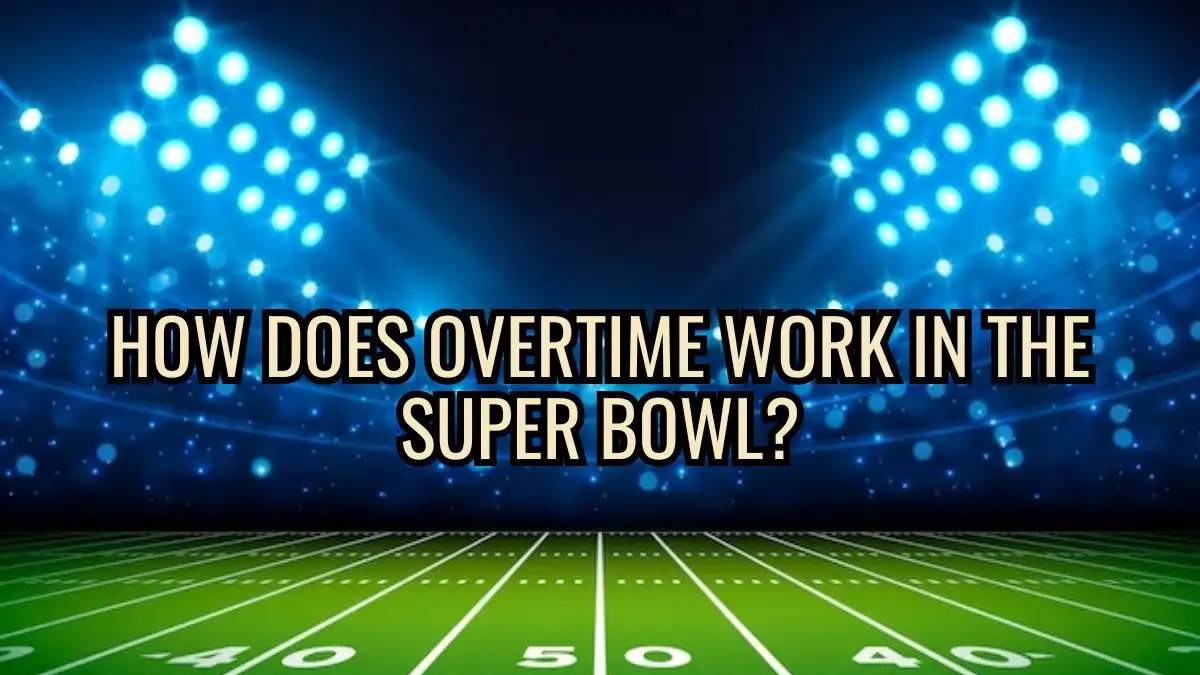How Does Overtime Work in the Super Bowl?
by Alaguvelan M
Updated Feb 12, 2024

How Does Overtime Work in the Super Bowl?
Overtime in the Super Bowl can be a bit confusing, especially with recent rule changes. After a controversial playoff game in 2022, the NFL decided to update its overtime rules to ensure fairness for both teams. Now, both teams get a chance to possess the ball, regardless of who scores first.
In the past, if a team scored first in overtime, they won the game immediately. But now, each team gets at least one possession in overtime, and if the game is still tied after both teams have had the ball, it continues. The next score then determines the winner.
So, if one team scores a touchdown on their first possession and the other team scores a field goal, the team that scored the touchdown wins. It's all about which team has the most points after each has had a possession.
And if overtime ends in a tie, which is rare but possible, the teams keep playing until there's a winner. There's no sharing the trophy in the Super Bowl; there has to be a clear winner.
Overtime in the Super Bowl now ensures that both teams have a fair chance to win, with each getting an opportunity to possess the ball. It's a change aimed at making the game more exciting and fair for everyone involved.
Don't miss out on important updates! Fresherslive brings you the most recent news and trending topics. Our articles are designed to be informative and accessible, ensuring that you stay in the know without any hassle. Start reading now to stay ahead of the curve.
When was the Last Time the Super Bowl Went in to Overtime?
The last time the Super Bowl went into overtime was in 2017 during Super Bowl LI between the New England Patriots and the Atlanta Falcons. It was a historic game that ended in a thrilling comeback victory for the Patriots.
The Patriots, led by quarterback Tom Brady, staged an incredible comeback after trailing the Falcons by a significant margin. They tied the game in the final minutes of regulation, forcing overtime with a score of 28-28.
In the overtime period, the Patriots won the coin toss and received the ball first. They capitalized on this opportunity by driving down the field and scoring a touchdown on their opening possession, sealing their victory.
This game marked the first and only time in Super Bowl history that the outcome was decided in overtime. It remains one of the most memorable moments in the history of the NFL's championship game.
Since then, the NFL has adjusted its overtime rules for postseason games, allowing both teams to have possession of the ball during overtime. This change came in response to the dramatic finish of Super Bowl LI and aims to ensure fairness in determining the winner of playoff games.
How Many Overtimes are Allowed in the Super Bowl?
The NFL made significant changes to the overtime rules for the playoffs, including the Super Bowl LVII, ahead of the 2022 season. This decision came after a memorable AFC divisional playoff game between the Chiefs and Bills, where Kansas City won with a touchdown on their opening drive of overtime.
Under the new regulations, both teams must have an opportunity to possess the ball at least once during the 15-minute extra period. If the team that kicks off scores a safety on the receiving team's initial possession, they are declared the winner.
If one team has more points after each has had a possession, they win. If the score is tied after each team has had a possession, the team next scoring by any method wins. If the score remains tied at the end of an overtime period or if the second team's initial possession has not ended, the teams will play another overtime period.
There will be a two-minute intermission between each overtime period, and the same timing rules apply as in regulation periods. Each team gets three timeouts in a half, and if there is still no winner after the fourth overtime period, another coin toss determines possession, and play continues until a winner is declared.
How Does Overtime Work in the Super Bowl - FAQs
The Super Bowl overtime rules dictate that both teams must have a possession of the ball, with the first team to score winning the game, unless the initial scoring team only manages a field goal.
In the Super Bowl, overtime consists of a 15-minute period, divided into two halves with a two-minute intermission.
If neither team scores during the initial overtime period, the game continues into additional overtime periods until a winner is determined.
Yes, a defensive touchdown or safety scored during the opening possession of overtime ends the game, with the scoring team declared the winner.
Yes, both teams are guaranteed an opportunity to possess the ball in Super Bowl overtime, ensuring fairness in deciding the outcome.







